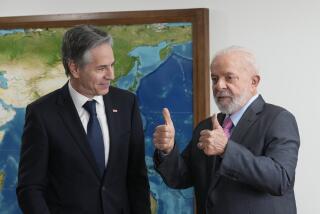Debt-Laden Brazil Softens Rhetoric, Plans to Resume Talks With IMF
- Share via
SAO PAULO, Brazil — Brazil, strapped with the Third World’s largest foreign debt, has subdued its nationalistic rhetoric and is preparing to resume negotiations for financial help from the International Monetary Fund.
Geraldo Moura, the Finance Ministry’s press spokesman, said an IMF mission was expected to arrive Monday in Brasilia, the capital, to start negotiating an 18-month standby loan of $700 million.
The talks end a three-year chill in relations between Brazil and the IMF, which was widely seen here as the epitome of foreign intransigence and meddling in this country’s internal affairs.
“Before the end of July, the agreement will be signed and relations between Brazil and the IMF will have been formally re-established,” Moura said.
He said the $700 million would help Brazil, which owes $121 billion to foreign creditors, to close this year’s balance of payments.
Brazil stopped negotiating with the IMF in 1985. Critics said the IMF’s proposed cure for the economy was recessionary, and nationalists protested that the agency’s monitoring of Brazil’s economic performance was an affront to the country’s sovereignty.
Then-Finance Minister Dilson Funaro said this country would never again submit an economic plan for IMF approval. Brazil would set its own goals, he said, and the IMF could take them or leave them.
But Brazil’s independent stance made foreign bankers balk at lending this country more money. And when the government in early 1987 suspended interest payments on about $70 billion owed to private banks, debt rescheduling talks came to a near standstill.
Rescheduling Plan
But late last year Brazil started to pay back some of the interest due, and in January Finance Minister Mailson da Nobrega said the government would negotiate with the IMF “an accord that will be of interest to the country.”
In March, Brazil and its private creditors reached a preliminary agreement to reschedule over 20 years most of what this country owes through 1993. Moura said only some legal details still had to be worked out and that the accord should be signed in June or July.
According to Moura, the outcome of the new negotiations with the IMF will depend on an agreement on an acceptable size for the government spending deficit.
The government has said that this year the deficit will be cut to 4% of the gross national product and to 2% in 1989. The deficit now stands at about 6% of the GNP, estimated roughly at $300 billion.
Moura denied reports that the IMF was pressuring the government to slash its deficit to zero. “That’s something Brazil will never be able to accomplish,” he said.
“What the IMF wants is to see a downward trend in the deficit, and this we are doing through the recent austerity measures,” he added.
In April, President Jose Sarney announced deficit-cutting measures that included a two-month wage freeze for government workers, a limit on the number of jobs public employees can hold, tax increases, financial incentives for early retirement or voluntary resignation, and an end to federal wheat subsidies.
New Credit Lines
The most important benefit of the agreement with the IMF, Moura said, will be “the reopening of credit lines from the Paris Club,” as the group of Western government lenders is called. He said these credit lines would help finance Brazilian imports of foreign machinery and other equipment needed “to modernize our industrial park.”
He said the IMF accord “has nothing to do with the debt renegotiation agreement” worked out with private creditor banks.
“The fact that both should be signed at about the same time is coincidental, although it is obvious that an agreement with the IMF will make private creditors breathe easier,” Moura said.
The agreement with the private creditor banks includes: a $5.8-billion loan to help pay part of the interest due in 1987, 1988 and 1989; the rescheduling, over 20 years with an eight-year grace period, of almost $64 billion in interest and principal due through 1993, and spreads (the extra interest banks charge high-risk clients) of 0.8125%, down from the 1.66% Brazil now pays.
More to Read
Sign up for Essential California
The most important California stories and recommendations in your inbox every morning.
You may occasionally receive promotional content from the Los Angeles Times.













